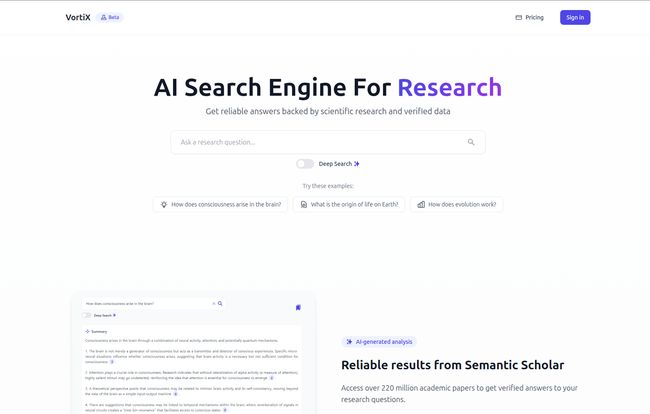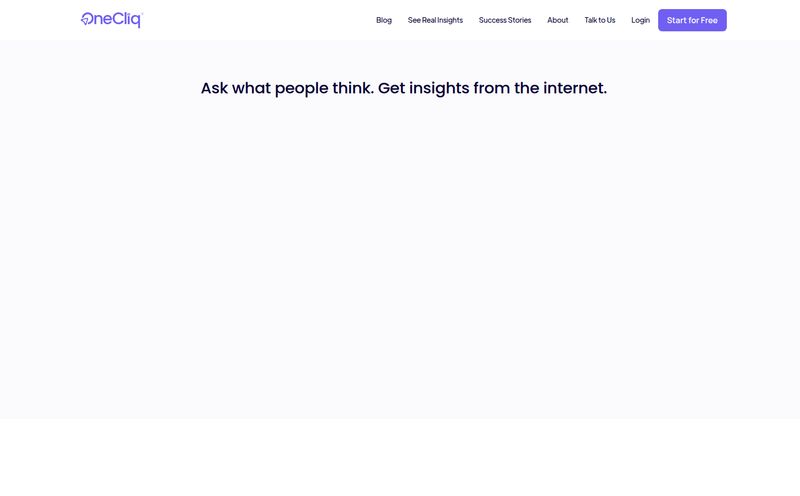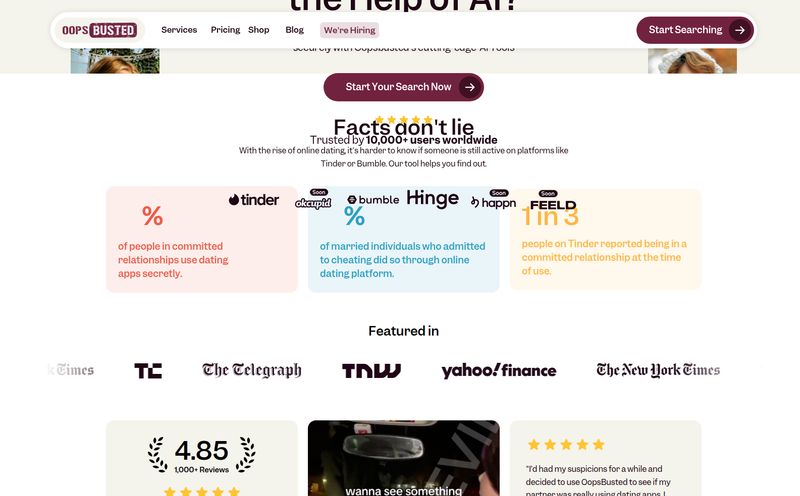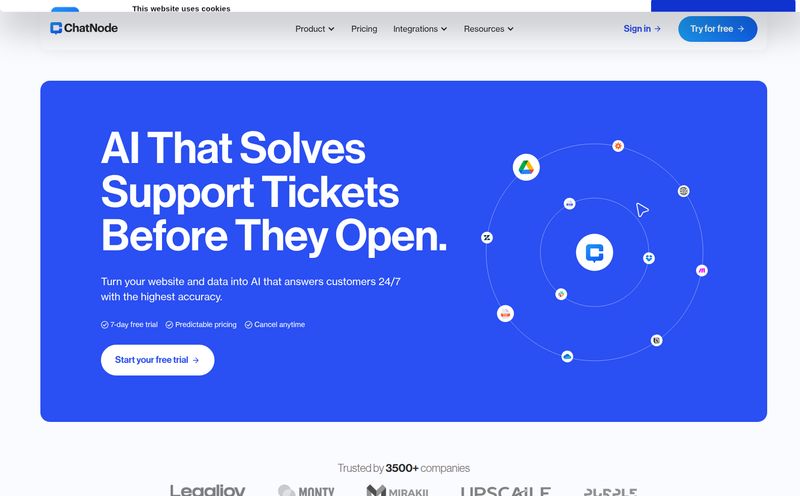We’ve all been there. It’s 1 AM, you’re surrounded by a fortress of half-read PDFs, and you’ve got about 27 browser tabs open. You're deep in the literature review rabbit hole, searching for that one specific citation to support your argument. The line between productive research and mindless scrolling has become… blurry. For years, this has just been the price of admission for anyone in academia, R&D, or heck, even serious content creation. You just grit your teeth and wade through the digital paper stacks.
But what if it didn’t have to be that way? Every so often, a tool pops up that makes me, a jaded SEO and traffic guy who’s seen it all, sit up and pay attention. Today, that tool is VortiX. It calls itself an AI-powered academic search engine, but from my initial tinkering, it feels like something more. It feels a bit like a research assistant, a summarizer, and a librarian all rolled into one slick interface. So, is it just another shiny object, or could it genuinely change how we interact with scientific literature?
So, What Exactly is VortiX?
On the surface, VortiX is a search engine for academic papers. Big deal, right? We have Google Scholar, PubMed, and a dozen others. But that’s where the comparison kind of ends. VortiX isn’t just an index; it’s an analysis engine. Instead of just throwing a list of links at you based on keywords, it uses AI to understand the intent behind your question and then goes a step further by generating summaries, pulling out key insights, and even letting you talk directly to the documents themselves.

Visit VortiX
The platform taps into the massive database of Semantic Scholar, which immediately gives it a huge credibility boost. We're talking access to over 220 million academic papers. This isn’t some startup scraping a few obscure journals; it’s standing on the shoulders of a giant, then adding its own AI magic on top. Think of it less like a dusty old card catalog and more like having a conversation with a brilliant professor who has read literally everything.
The Features That Actually Matter
A feature list is just a list until you see how it actually helps. Here’s what stood out to me during my review.
The AI-Powered Search is a Different Beast
We’re all trained to think in keywords. “Effects of caffeine on productivity,” for example. VortiX can handle that, sure, but it shines when you ask it a real question, like “How does consciousness arise in the brain?” It goes beyond simple string matching to find papers that are conceptually related, which can uncover research you might have missed otherwise. It’s a subtle but powerful shift from searching for words to searching for meaning.
Chat with Papers: Seriously, This is the Future
Okay, this is the one that got me really excited. The “Chat with Papers” feature is the star of the show. You find a promising paper, but you’re not sure if it’s worth a full read. Instead of skimming the abstract and conclusion, you can just… ask it questions. “What was the sample size for this study?” “Does this paper mention a conflicting theory?” “Explain the methodology in simpler terms.” The AI reads the document and gives you a direct answer, often with a citation. This is an incredible time-saver. I think back to my university days, and the hours I could have saved… it almost hurts.
Instant Summaries and Insight Synthesis
Finding the right paper is only half the battle. Reading and digesting it is the other, more time-consuming half. VortiX automatically generates AI-powered summaries and analyses. This is perfect for getting the gist of a paper in seconds. Is it a replacement for a deep, critical read? No, of course not. But as a triage tool to quickly sort the highly relevant from the “maybe later,” it’s fantastic. It helps you build a foundational understanding before you commit to the heavy lifting.
An Honest Look: The Good and The Could-Be-Better
No tool is perfect, especially one in beta. Here's my no-fluff breakdown.
"VortiX is moving in the right direction. It's not just about finding information anymore; it's about interacting with it. That's the leap we need to make research more efficient and, dare I say, more enjoyable."
On the plus side, the sheer potential for accelerating the research process is immense. The combination of a massive database, an intelligent search function, and the groundbreaking chat feature makes for a compelling package. It’s fast, the UI is clean, and it genuinely feels like it solves a real, painful problem for its target users. It lowers the barrier to entry for understanding complex topics, which is a huge win.
On the other hand, it’s still new. The website notes that the search might not find every single specific paper you're looking for, which is a fair bit of honesty. I’d also love a bit more transparency on the depth of the search—is the AI reading the full text of all 220 million papers, or primarily abstracts and metadata? This will likely improve as the tool matures out of beta. And yes, it requires JavaScript to run, but let's be real, what doesn't these days?
Who is This Tool Really For?
While I can see a lot of people getting use out of this, the prime audience is pretty clear. Grad students and PhD candidates are going to weep with joy. Professional researchers and scientists in R&D departments can speed up their discovery process significantly. I also think it’s a killer tool for journalists, policy advisors, and nonfiction writers who need to quickly get up to speed on scientific topics and find verified data to support their work.
So, How Much Does VortiX Cost?
This is the big question, isn't it? As of writing this, VortiX is still in a beta phase. The site has a “Pricing” link in the header, but no public pricing plans are listed just yet. This is pretty standard for a new platform that's still gathering user feedback and refining its features. My guess is we might see a freemium model emerge, perhaps with a limited number of free searches or a premium tier for advanced features. For now, you can sign up and use it, which I’d recomend doing while it’s still in this open phase.
How Does VortiX Stack Up Against Google Scholar?
This is not really an apples-to-apples comparison. Google Scholar is the undisputed king of indexing. It's a vast, comprehensive library. But it’s just that—a library. It gives you the books and sends you on your way.
VortiX is more like the helpful librarian who walks you through the stacks, points out the most relevant chapters, and summarizes the plot for you. It's a different, more interactive paradigm. While tools like Consensus and Elicit.org are also playing in this AI research space, VortiX’s clean interface and the “Chat with Papers” feature give it a unique flavor that I find very appealing.
Frequently Asked Questions about VortiX
What database does VortiX use for its searches?
VortiX is built upon the Semantic Scholar database, giving it access to a massive and credible collection of over 220 million academic papers and scientific articles.
Is VortiX free to use?
Currently, VortiX is in its beta stage and available for use. Official pricing tiers have not been announced yet, so it's a good time to try it out and see how it fits into your workflow.
How does the "Chat with Papers" feature actually work?
It uses a sophisticated AI model to read and understand the content of a specific paper. You can then ask it direct questions about the paper's methodology, findings, or definitions, and the AI will pull the answer directly from the text.
Can VortiX find any academic paper I look for?
While its database is enormous, no search engine is 100% exhaustive. It's incredibly powerful for discovery and finding relevant literature, but there might be rare instances where a very niche or newly published paper isn't indexed yet.
Is this tool only for professional scientists?
While it's designed with scientific research in mind, it's incredibly useful for anyone who needs to engage with academic literature. This includes students, journalists, policy analysts, and curious minds who want answers backed by verified data.
The Final Verdict: Should You Give VortiX a Shot?
Absolutely. Yes. Without a doubt.
Even in its beta form, VortiX is a glimpse into the future of research. It's one of the most promising applications of AI I've seen in the academic space. It doesn’t replace critical thinking, but it does handle the most tedious, time-consuming parts of the research process, freeing you up to do the work that actually matters: thinking, connecting ideas, and forming new conclusions. It turns the monologue of reading into a dialogue with the information itself.
If you've ever felt the pain of the late-night literature search, do yourself a favor and give VortiX a spin. It just might be the research assistant you've always wished you had.
Reference and Sources
- VortiX Official Website: https://vortix.ai/
- Semantic Scholar: The database powering VortiX's search capabilities. https://www.semanticscholar.org/



